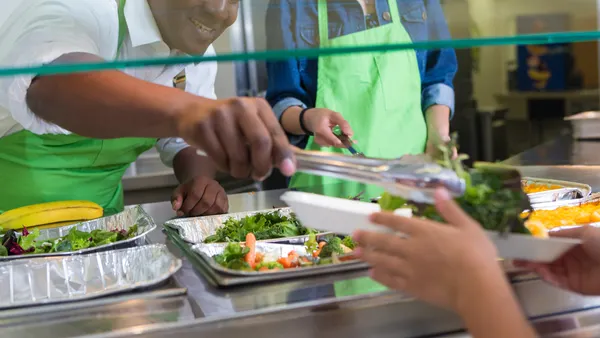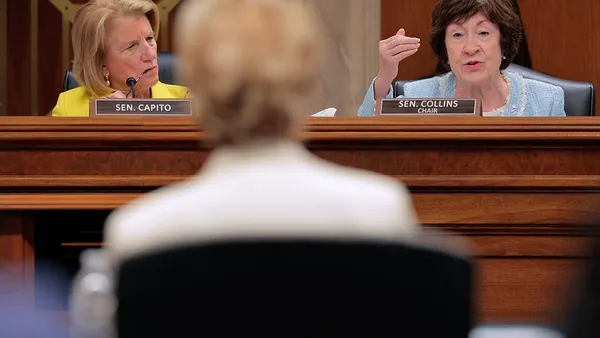Dive Brief:
- A bipartisan bill introduced by Sen. Debbie Stabenow, D-Michigan, and Sen. Lisa Murkowski, R-Alaska, and co-sponsored by 50 other senators would keep universal school meals in place through September 30, 2023.
- This provision and other meal waivers, all currently set to expire June 30, give schools and summer meal programs flexibility to handle ongoing supply chain issues and feed all children in schools operating U.S. Department of Agriculture meal programs.
- As school nutrition advocates express urgency to pass the Support Kids Not Red Tape Act as soon as possible, Stabenow is exploring options to tack the measure onto the Senate's upcoming $10 billion COVID-19 relief package, a spokesperson for the Senate Committee on Agriculture, Nutrition and Forestry said Monday.
Dive Insight:
It is significant this bill has support from a majority of the Senate — and that it's bipartisan support, said Diane Pratt-Heavner, School Nutrition Association spokesperson.
“This is our best hope” for congressional extension of the meal waivers, she said.
SNA has been lobbying members of Congress about the urgency of extending nutrition waivers for schools since December, Pratt-Heavner said. Advocates were disappointed when the provision was left out of the final fiscal 2022 federal appropriations bill, signed into law by President Joe Biden on March 15.
“We should make it easier for kids to get the meals they need — not harder. Our bill cuts red tape and keeps the priority on giving children the healthy meals they need and deserve,” Stabenow said in a statement. “As we come out of this pandemic, schools are doing their best — but it takes time for them to transition back to their operations before COVID.”
In a USDA survey conducted in March, 90% of school food authorities used the waiver that offered all students free meals at the higher Summer Food Service Program reimbursement rates. On top of that, 92% of school food authorities reported supply chain disruptions, and they expect the issue to continue into the 2022-23 school year.
Meal waivers made a significant financial impact on districts and helped prevent them from reporting a deficit, as the survey found 71% of school food authorities were at least breaking even as of October 2021.
Murkowski said in a statement she’s happy to join the push to extend meal waivers and take down barriers that may prevent students from receiving a healthy meal.
“Following the widespread disruptions caused by COVID, life is beginning to feel more 'normal' for some,” Murkowski said. “However, many Alaskans are still working to overcome the economic fallout from the pandemic and many schools continue to struggle with supply shortages and higher prices.”
As the deadline looms to continue the waivers, Pratt-Heavner said it’s a "little too late" for some school nutrition programs to run a summer meal program this year given that their academic year ends in mid-May. They needed more advanced notice to order food items and supplies for the program, she said.
The proposed legislation would require schools to make a plan to transition back to normal meal operations.
Overall, it would in fact help provide schools time to recover and transition back to normal school nutrition operations in a thoughtful way for the 2022-23 school year, said Crystal FitzSimons, director of school and out-of-school time programs at the Food Research and Action Center.
“We are very excited about this bill,” FizSimons said. “We think that Congress needs to act quickly on it and either pass the bill as a standalone bill or attach it to any vehicle that is moving, because we are very concerned about what is going to happen this summer and next school year if these waivers are not extended.”












